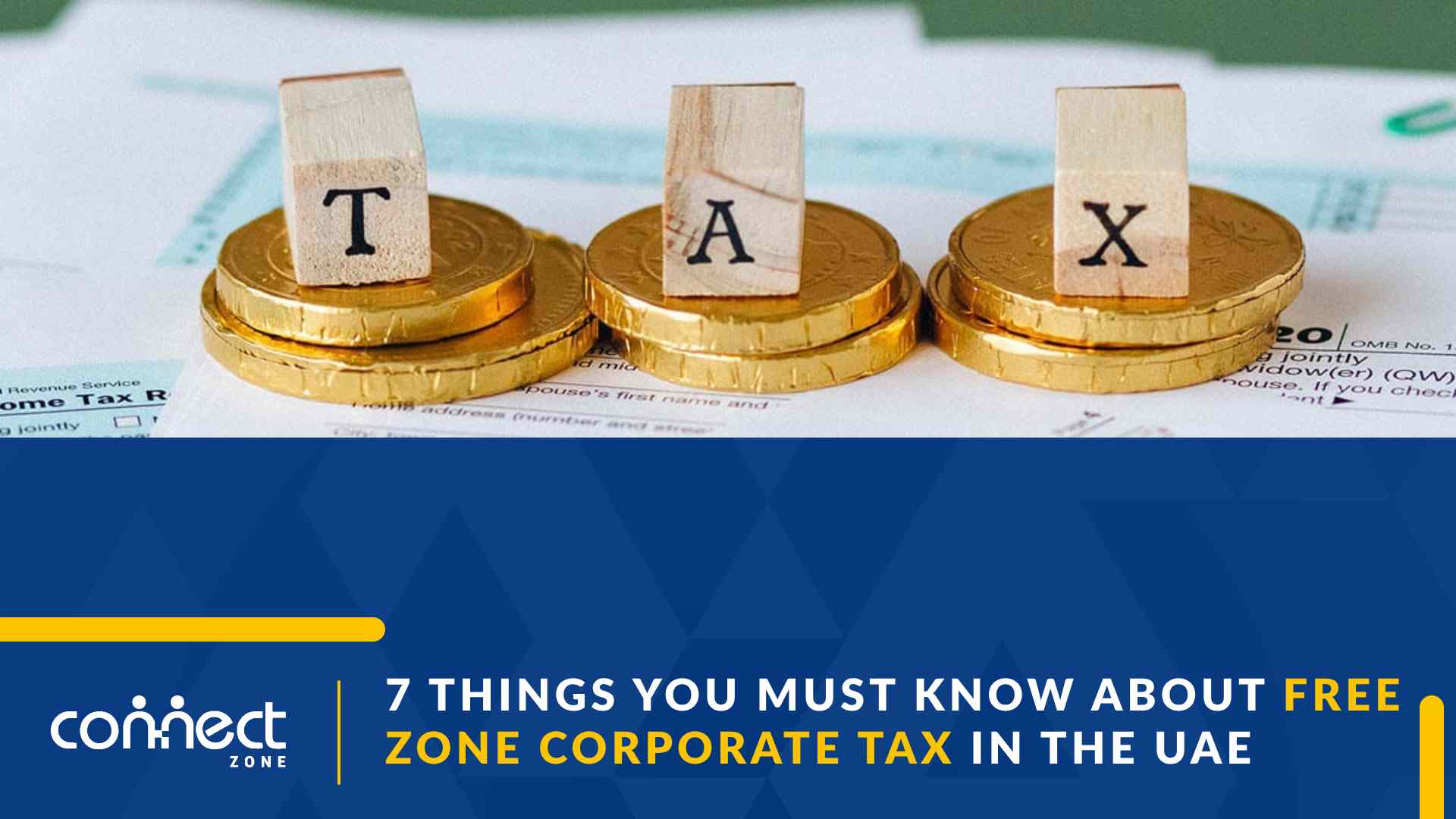7 Things You MUST Know About Free Zone Corporate Tax in the UAE

From June 2023, the corporate tax UAE will affect companies located in the Free Zone of the Emirates. Similarly, the Ministry of Finance and the Federal Tax Authority by its acronym FTA establish these measures. Likewise, with this new policy, the corporate tax may be from 0 to 9% depending on qualified income.
In this article, we will discuss these new policies and their effects on the business landscape of the UAE free zone. Also, you will learn the impact it will have on the companies and citizens of this area of the United Arab Emirates.
1. UAE Free Zone Corporate Tax Incentives and Exemptions
The corporate tax UAE 2024 will impact companies belonging to the Emirati free zone. However, industries that comply with regulations and do not operate in the continent, will obtain the advantages of corporate tax. Furthermore, according to the Federal Income Tax Decree, free zones in the Emirates must register and provide corporate declarations. Consequently, the person or company must pay the tax according to the following rates:
- 0% on qualified income
- 9% on taxable income that is not within Qualified Income.
Additionally, the FTA is the one that defines and determines the qualified income for the entities or people of the free zone. However, you must calculate this tax for corporations in mainland according to the income acquired by the company.
Tax Privileges for Free Zone Companies
The tax advantages that companies in free zones have constitute an absolute potential if you want to invest here. Likewise, thanks to the regulations of the govern organizations; they give companies competitive advantages, especially in corporate taxes. Furthermore, the most attractive of the advantages is that you may have an exception in paying taxes and VAT.
However, if the profits of your company exceed AED 375,000, you will pay corporate tax UAE of 9% on qualifying income.
Sign up for tax exclusions
Your company must do the corporate tax registration in the free zone to be able to enjoy tax benefits. In this case, each area will serve different types of specific companies. Likewise, within these free zones, 3 types of business entities may be established:
- Branch of a business company
- Establishment of a Free Zone (FZE)
- Free Zone Company (ZLC)
Some areas will provide you with double licenses so that you can do business in the continental territory and the free zone of the emirate. The Ministry of Finance of the United Arab Emirates issued the dual business license. However, if your company is in the free zone, you will only be able to operate in the zone and outside the Emirates.
Additionally, if you wish, you can request a permit from the respective authority of the free zone where your company is located to expand your operations to the continent.
How to apply for UAE corporate tax 2024 exemptions
Applying for the exemptions for corporate tax in UAE and founding a business is a very simple task. In this sense, you will need to provide the required documentation and comply with the process according to the commercial activity you chose and the name of the qualified person. During the installation process, you will have at hand the support offered by the free zone authorities.
Likewise, they will guide you to open corporate bank accounts and financial services, including visas for dependents and shareholders. Moreover, you can obtain professional advice and networking services.
Duration and limitations of exemptions
Exemptions in the corporate tax UAE will offer you significant benefits, but you should be well aware of their duration and what the limitations are. Therefore, you will get exemptions from direct taxes if your company trades within the free zone or outside the Emirate.
However, if your company reaches the continent you will have to request permission from the corresponding authority in the free zone where you are established.
2. Eligibility Criteria for UAE Free Zone Corporate Ta
The criteria for eligibility to apply UAE corporate tax are classified as follows:
- QFZP or Qualified Free Zone Person. This will comply with the particular conditions indicated in the tax regulations. In this case, you will be able to enjoy tax advantages such as 0% taxes, as indicated by legislation.
- NQFZP or Non-Qualified Free Zone Person. This is an FZP that does not have the conditions that are needed for a QFZP. Thus, you may not be able to have access to sales or tax exceptions than the previous one.
Likewise, you must handle the previous terms very well because the tax obligations and advantages that you will obtain will depend on this.
3. Qualifying Income vs. Non-Qualifying Income
Knowing the concept of qualifying income under the rules for corporate tax UAE in free zones is important for you. Therefore, you should know that income will be classified depending on the type of transaction and those involved in it. Below you can see the types of transactions with specific people:
Transactions with Other Free Zone Persons
In this type of transaction, they are the income from all transactions, less than those from excluded activities. That is, the income that comes from these transactions is considered qualified if it is not from excluded activities.
Transactions with Non-Free Zone Persons
These include the only income from qualified activities. Furthermore, if you include some excluded ones, the income from the activity will not be considered qualified.
Revenue from all other transactions
In this case, any other income obtained by a qualified person located in the free zone will be included, if it meets the minimis requirements. In this case, it refers to lower limits of income that can be considered qualifying. Also, consider that qualifying income does not involve any income from a foreign or domestic permanent company.
Non-qualified income
In this case, it is the income from a tax period coming from the Excluded Activities. Hence, they are those that do not come from qualified activities and the other part is a person who does not belong to the free zone.
4. The De Minimis Rule
This de minimis rule of corporate taxes in the UAE will be what the FZP-qualified person must comply with concerning their non-qualified income. Hence, it means that the non-qualified income from the qualified FZP will have to be less than 5% of the income or AED 5 Million. Likewise, non-qualified income is what comes from tax time from the sources that you will see below:
- Excluded activities. They are those that are not included in the qualified activities and where a counterparty is a person who is not in the free zone.
- Total revenue. In this case, the income derived from a person from the free zone qualified at tax time will be included.
Total and Non-Qualified Income Exceptions
There are income categories that are not in the total non-qualified income calculation, which include the following:
- Attributable income from real estate located in the Free Zone derived from transactions. One is the transaction with people who are not from the free zone and commercial goods. The other is with people referring to non-commercial properties.
- Income applicable to the national permanent establishment or a foreign permanent establishment of the Person from any Qualified Free Trade Zone.
5. Industry-Specific Considerations of UAE Free Zone
Within the business considerations of the free zone they are divided into 3 categories as you will see below:
Qualified Activities
It is a group of 13 activities mentioned in Cabinet decision number 139 of 2023. Similarly, in the activities of the free zones that have the conditions, they will be considered participation in qualified activities. They will also be able to obtain rights to advantages regarding the corporate tax UAE. Next, you will find out which activities are considered qualified:
- Manufacture of goods or materials.
- Processing of goods or materials.
- Holding shares and other securities.
- Ownership, management, and operation of Ships.
- Reinsurance services
- Fund management services
- Wealth and investment management services.
- Headquarters Services to Related Parties.
- Treasury and financing services to Related Parties.
- Financing and leasing of Aircraft, including engines and rotating components.
- Logistics services.
- Any activity related to those stated above.
Excluded activities
7 activities are considered excluded according to the provision established by the Cabinet. In this sense, companies in free zones that carry out this activity are not necessarily eligible to obtain tax exemptions or advantages. Next, you will see the list of activities considered excluded:
- Any transaction with natural persons. Excluded from this group are Ship Ownership and Management, Fund Management Services and Asset Management Services, and Aircraft Financing and Leasing.
- Banking activities.
- Insurance activities, except reinsurance activities.
- Financing and leasing activities accepted, Treasury and financing services to Related Parties, Financing and leasing of Aircraft.
- Operation or ownership of real estate. Additionally, Commercial Property located in the Free Zone where the transaction concerning said Commercial Property is carried out with other Free Zone Persons is not included.
- Exploitation of intellectual property assets.
- All activities that are accessory to the previous ones.
Additional activities
This last category includes activities that do not appear in the excluded or qualified group. Furthermore, the corporate tax UAE for this category of activities will be different depending on its type and applicable tax rules.
6. Compliance and Reporting Requirements of UAE Free Zone Corporate Tax
The corporate tax UAE filing process is easy, especially for industries that are within the free zones. In these areas, you can find advantages such as customs duties and trade without monetary reserves. Likewise, you will be able to find qualified international employees very easily.
However, if you have your company in a free zone, you will not be able to operate directly in the local trade of the Emirates. Nevertheless, you can overcome this by networking with investors in the companies in conjunction with a local distributor. You could also establish branches of your business in the Emirate Dubai and the rest of the UAE.
On the other hand, if you plan to establish your business in the free zone, it will be easy for you because the government of the zone requests short procedures and periods. Nonetheless, in each free zone, there are different procedures and restrictions.
7. Future Opportunities and Considerations to Free Zone Corporate Tax
Regarding the trends for UAE corporate taxes, there are certain considerations shortly. Therefore, people and companies must be attentive to the following aspects:
Propensities that will affect corporate tax
Regarding the corporate tax UAE 2024 for companies in free zones, consider that it has undergone major transformations. Furthermore, with the implementation of the current corporate tax law, an important change was obtained. Also, the law says that companies that have profits greater than AED 375000 will be subject to paying 9% tax.
Evolution of Corporate Tax UAE Policies
You should anticipate possible changes in UAE corporate tax policies. In this case, consider that the current corporate tax law provides a new starting point. Likewise, you should know that in the Emirates there are more than 40 free zones. They serve different sectors of the industry and are governed by the FZA.
How it affects international tax regulations
UAE free zones are attractive if you are a foreign investor because they offer full ownership of the company, capital, and profits. However, these advantages could be affected by alterations in global tax regulation.
Projection of tax contents
Possibly, if your company is in the free zone, you will need to prepare for possible tax changes. Likewise, you should be well aware of the rules for corporate tax UAE in the area where your business is located. In addition, you must manage the restrictions and requirements that you will need to operate in the free zones.
Equally, you must obtain a commercial license valid for 1 year that you will have to renew every year. Additionally, remember that you must request the license following the activity that your business will carry out.
Conclusion
In free zones, the corporate tax UAE can be as high as 0% depending on the type of business and the classification of the activity. Therefore, you must know perfectly the law in the free zone where you will establish your business. However, you can request the help of experts like us who will help you when needed, just by contacting us. Get VAT & Tax Consultancy!
FAQs
Who is required to pay corporate tax in the UAE?
Businesses earning taxable income above the threshold are required to register and pay corporate tax.
What is the corporate tax rate in the UAE?
The standard corporate tax rate is 9 percent on taxable income above the exempt threshold.
When does corporate tax apply in the UAE?
In the UAE, corporate tax applies to financial years starting on or after June 2023.
Are free zone companies exempt from UAE corporate tax?
If compliance conditions are met, qualifying free zone companies may enjoy tax benefits.
How to register for corporate tax in the UAE?
UAE corporate tax registration happens through the Federal Tax Authority (FTA) online portal.
What penalties apply for corporate tax non-compliance?
Non-compliance with corporate tax leads you to face fines for late registration, incorrect filings, and failure to submit returns.


